Science
(www.olympiadsuccess.com)
Chapter 13: Fun with Magnets
Class: VI
Exemplar Solutions
Multiple Choice Questions
Question 1
Observe the pictures A and B given in Fig. 13.1 carefully.
(A) 
(B) 
Fig.13.1
Which of the following statement is correct for the above given pictures?
(a) In A, cars 1 and 2 will come closer and in B, cars 3 and 4 will come closer.
(b) In A, cars 1 and 2 will move away from each other and in B, cars 3 and 4 will move away.
(c) In A, cars 1 and 2 will move away and in B, 3 and 4 will come closer to each other.
(d) In A, cars 1 and 2 will come closer to each other and in B, 3 and 4 will move away from each other.
Answer 1
(d)
Question 2
The arrangement to store two magnets is shown by figures (a), (b), (c) and (d) in Fig. 13.2. Which one of them is the correct arrangement?
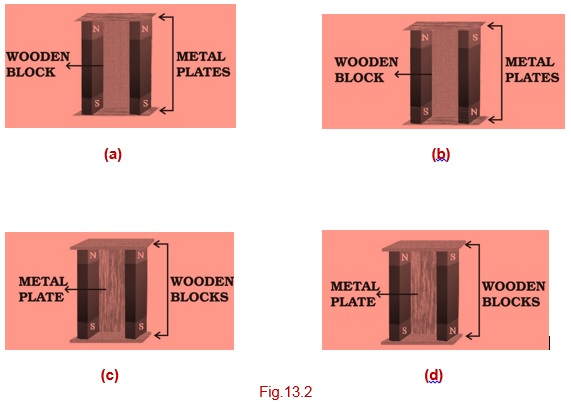
Fig.13.2
Answer 2
(b)
Question 3
Three magnets A, B and C were dipped one by one in a heap of iron filing. Fig. 13.3 shows the amount of the iron filing sticking to them.
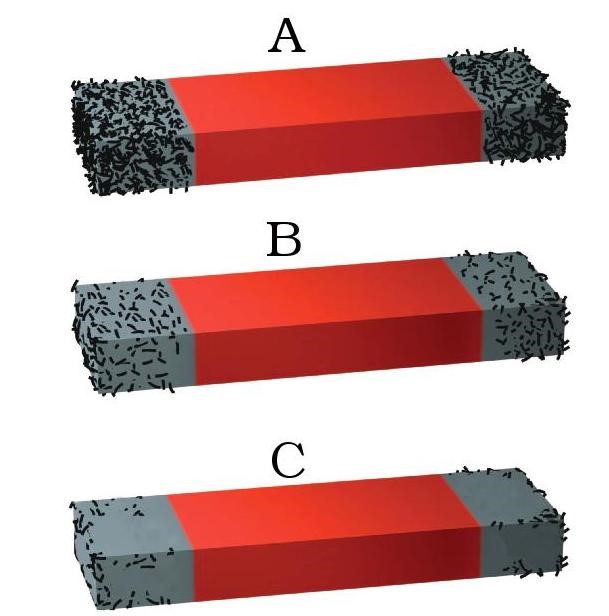
Fig.13.3
The strength of these magnets will be
(a) A > B > C
(b) A < B < C
(c) A = B = C
(d) A < B > C
Answer 3
(a)
Question 4
North pole of a magnet can be identified by
(a) Another magnet having its poles marked as North pole and South pole.
(b) Another magnet no matter whether the poles are marked or not.
(c) Using an iron bar.
(d) Using iron filings.
Answer 4
(a)
Question 5
A bar magnet is immersed in a heap of iron filings and pulled out. The amount of iron filling clinging to the
(a) North pole is almost equal to the south pole.
(b) North pole is much more than the south pole.
(c) North pole is much less than the south pole.
(d) Magnet will be same all along its length.
Answer 5
(a)
Very Short Answer Questions
Question 6
Fill in the blanks
(i) When a bar magnet is broken; each of the broken part will have ............ pole/poles.
(ii) In a bar magnet, magnetic attraction is ............. near its ends.
Answer 6
(i) two
(ii) more
Question 7
Paheli and her friends were decorating the class bulletin board. She dropped the box of stainless steel pins by mistake. She tried to collect the pins using a magnet. She could not succeed. What could be the reason for this?
Answer 7
The pins are made of stainless steel which is a non/magnetic material.
Question 8
How will you test that ‘tea dust’ is not adulterated with iron powder?
Answer 8
By using a magnet. If it has iron powder they will stick on to the magnet.
Question 9
Boojho dipped a bar magnet in a heap of iron filings and pulled it out. He found that iron filings got stuck to the magnet as shown in Fig. 13.4.
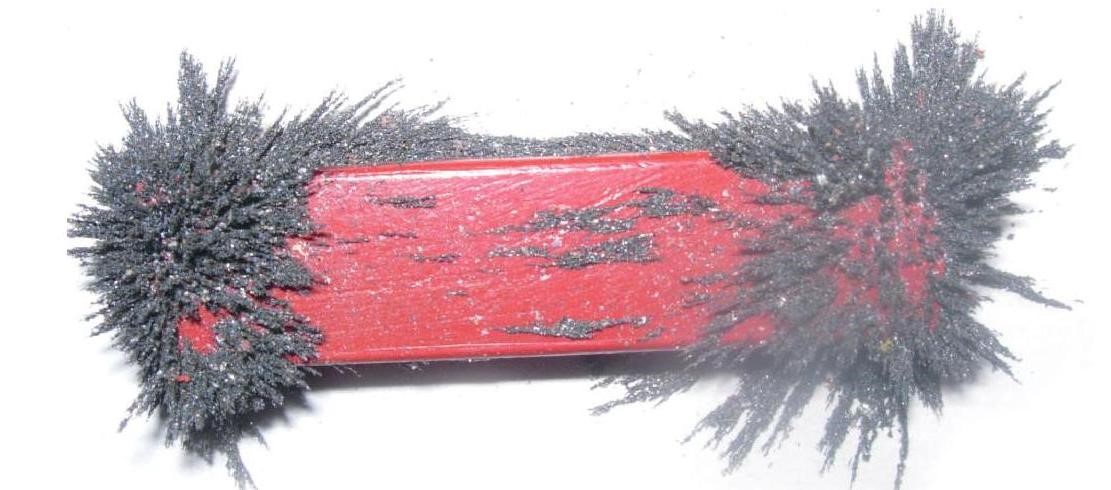
Fig.13.4
(i) Which regions of the magnet have more iron filings sticking to it?
(ii) What are these regions called?
Answer 9
(1) The end of the magnet has more iron fillings attached to it.
(2) These regions are called poles of the magnet.
Short Answer Questions
Question 10
Four identical iron bars were dipped in a heap of iron filings one by one. Fig. 13.5 shows the amount of iron filings sticking to each of them.
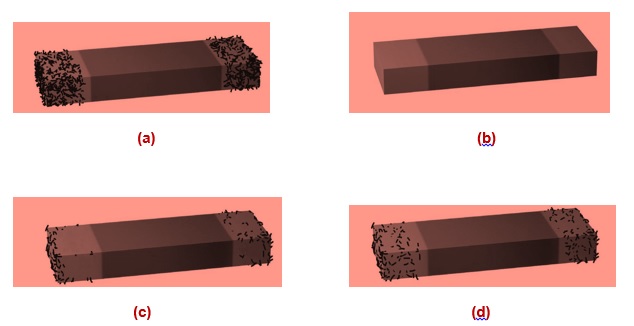
Fig.13.5
(a) Which of the iron bar is likely to be the strongest magnet?
(b) Which of the iron bars is not a magnet? Justify your answer.
Answer 10
(a) A
(b) B because there are no iron filings sticking to it.
Question 11
A toy car has a bar magnet laid hidden inside its body along its length. Using another magnet how will you find out which pole of the magnet is facing the front of the car?
Answer 11
If the front of the toy car gets attracted to the north pole of the given magnet then it is the south pole of the bar magnet hidden inside the car.
Question 12
Match Column I with Column II (One option of A can match with more than one option of B)
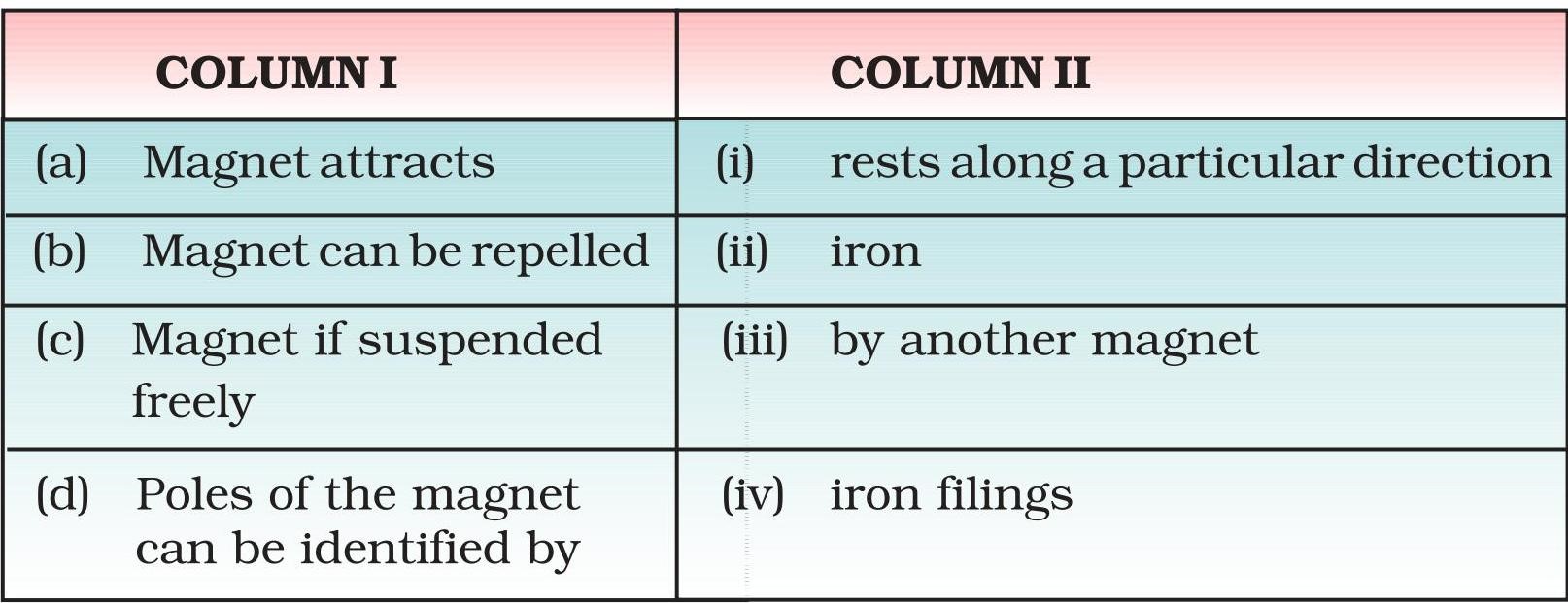
Answer 12
(a) ii, iii and iv
(b) iii
(c) i
(d) iii
Question 13
You are provided with two identical metal bars. One out of the two is a magnet. Suggest two ways to identify the magnet.
Answer 13
(1) By suspending the metal bars
(2) By attracting iron filings
(3) Using another magnet
Long Answer Questions
Question 14
Three identical iron bars are kept on a table. Two out of three bars are magnets. In one of the magnet the North-South poles are marked. How will you find out which of the other two bars is a magnet? Identify the poles of this magnet.
Answer 14
The magnet with known poles will attract and repeat two ends of a magnet and attend both the end of an ordinary bar. (Test for repulsion)
Question 15
Describe the steps involved in magnetizing an iron strip with the help of a magnet.
Answer 15
By rubbing the iron with a magnet as shown in the figure below.
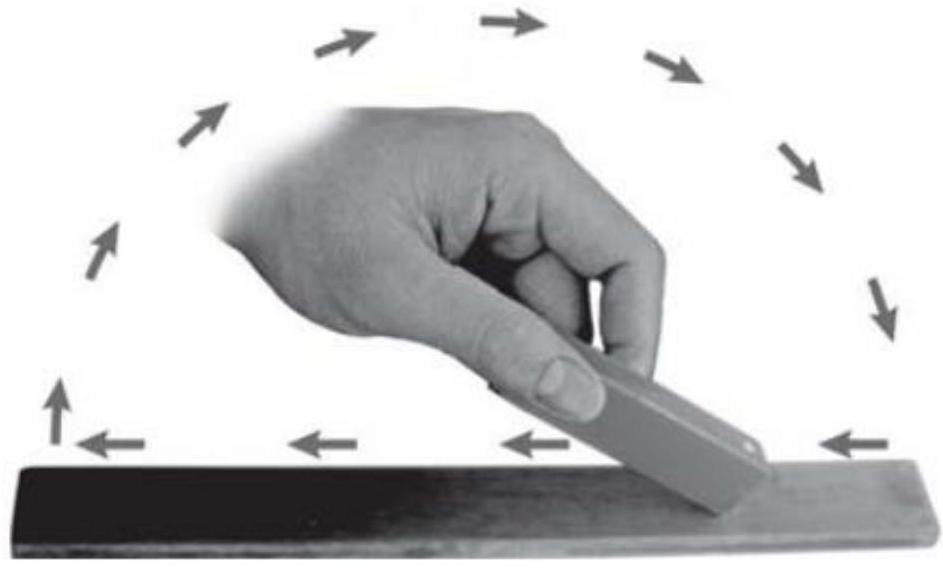
Question 16
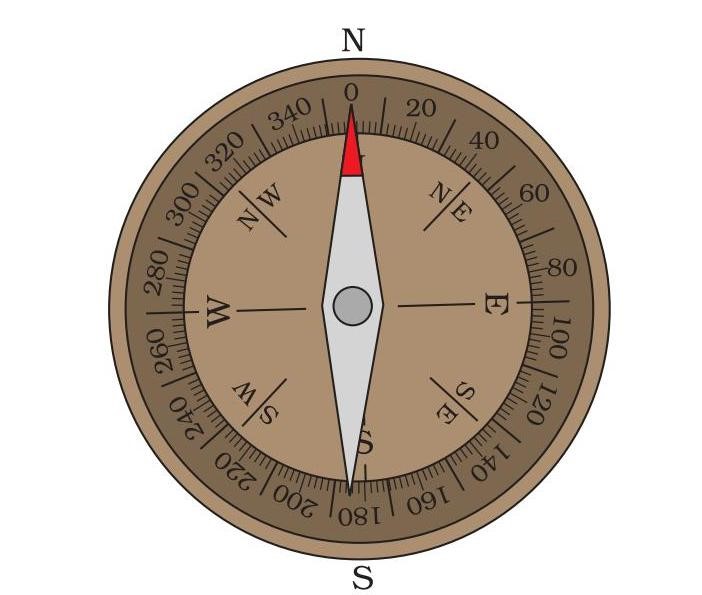
Fig.13.6
Fig. 13.6 shows a magnetic compass. What will happen to the position of its needle if you bring a bar magnet near it? Draw a diagram to show the effect on the needle on bringing the bar magnet near it. Also draw the diagram to show the effect when the other end of the bar magnet is brought near it.
Answer 16
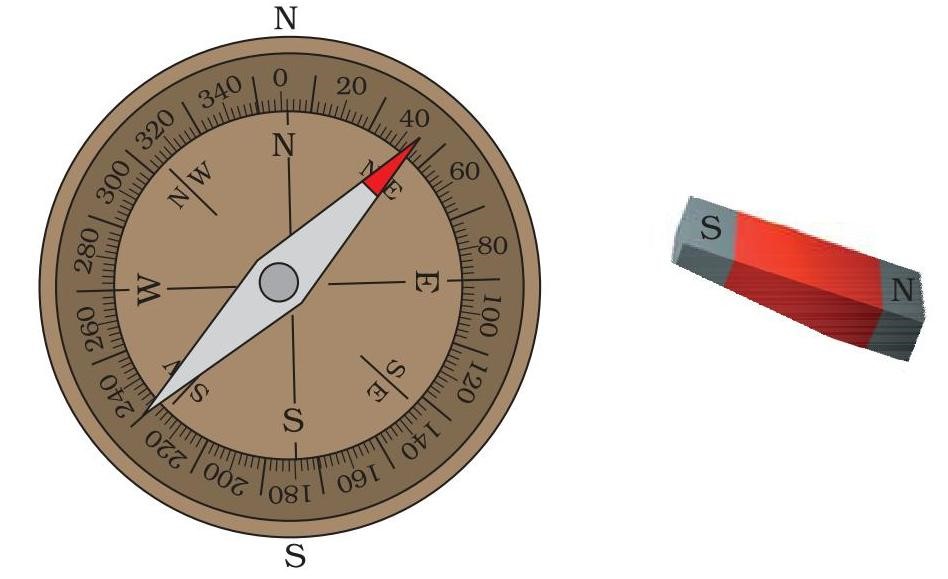
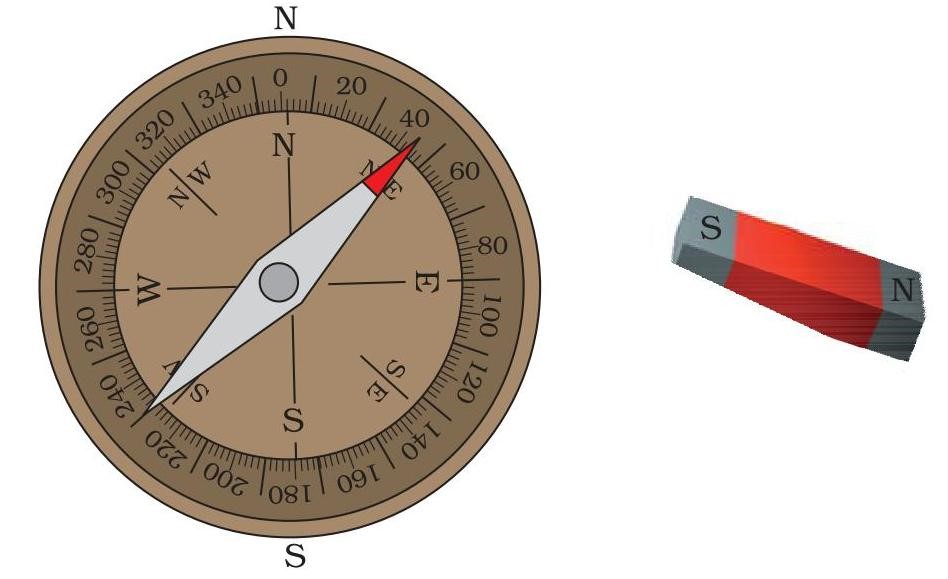
Question 17
Suggest an activity to prepare a magnetic compass by using an iron needle and a bar magnet.
Answer 17
Magnetize the needle and set it in a way that it may rotate freely when suspended.
Question 18
Boojho kept a magnet close to an ordinary iron bar. He observed that the iron bar attracts a pin as shown in Fig. 13.7.

Fig.13.7
What inference could he draw from this observation? Explain.
Answer 18
The magnetic properties are induced into the iron bar and it acts like a magnet till the magnet is kept near it.
Question 19
A bar magnet is cut into two pieces A and B, from the middle, as shown in Fig. 13.8.

Fig.13.8
Will the two pieces act as individual magnets? Mark the poles of these two pieces. Suggest an activity to verify your answer.
Answer 19
By the test of repulsion
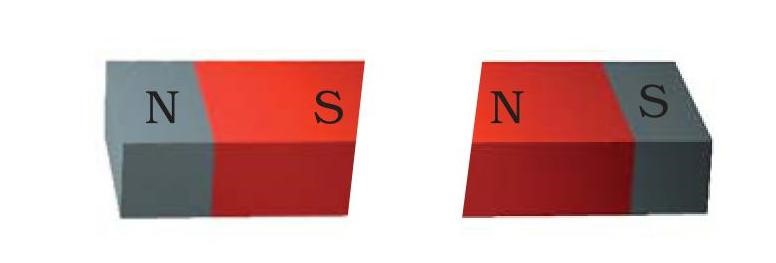
Question 20
Suggest an arrangement to store a U shaped magnet. How is this different from storing a pair of bar magnets?
Answer 20
U shaped magnet– One metal plate is placed across the two poles of the U shaped magnet.
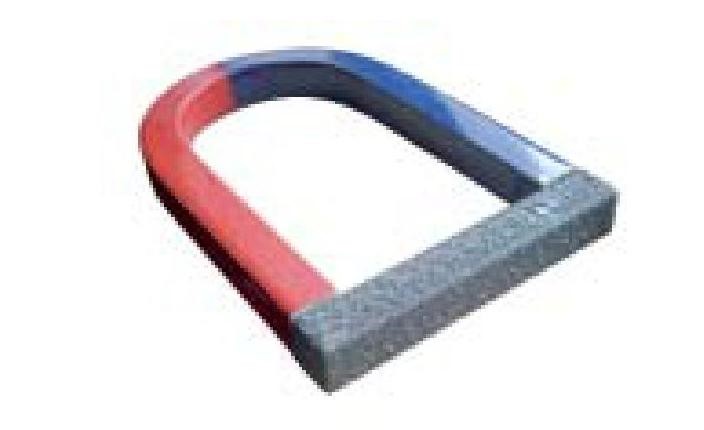
Bar magnet– Use two metal plates and one wooden block, arrange them as shown in the figure
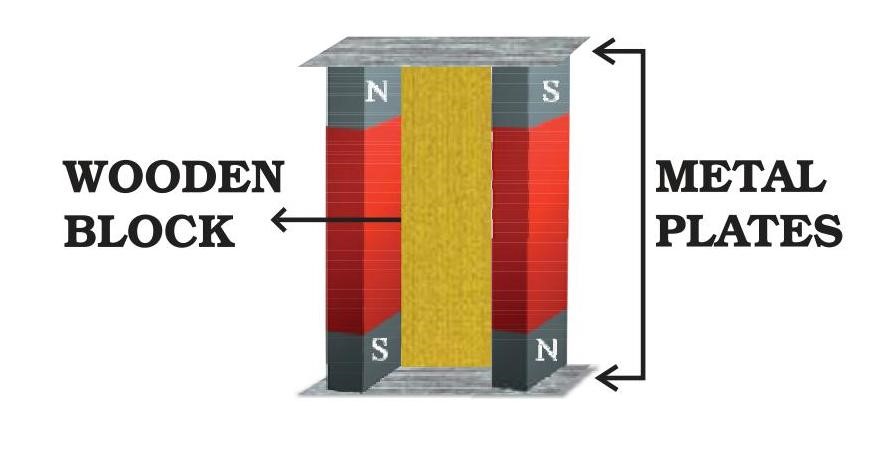
Yearlong program for Olympiads preparation & to build necessary skills for future.
Explore More
Time to mark your calendar with the upcoming Olympiads exam schedule.
Explore More
Take your Olympiad preparation to next-level by taking LIVE Classes.
Explore More
Assess your performance by taking topic-wise and full length mock tests.
Explore More
Online tuitions for international compeitions like SASMO, SEAMO, etc for Grades 1-11.
Explore More